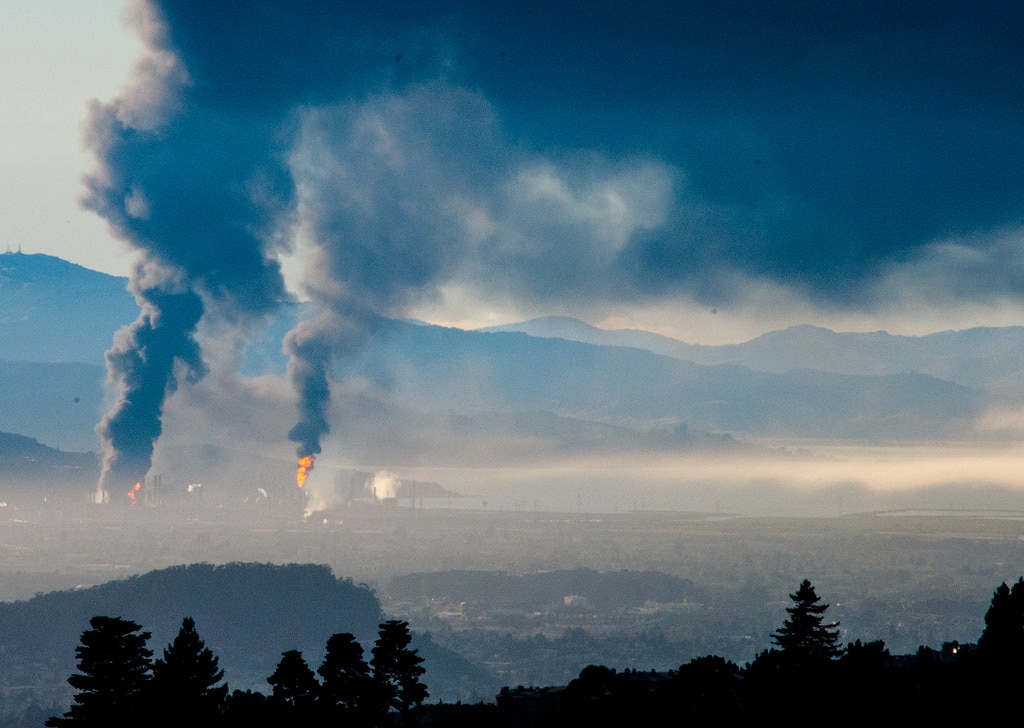
The California legislature just extended cap and trade. 3,000 people will die.
Richmond, California has been my home for the past 15 years. It’s also home to the largest refinery on the west coast, operated by Chevron, California’s single largest stationary source of greenhouse gas emissions.
For almost four years, Richmond’s environmental justice advocates have been campaigning to prevent Chevron from embarking on a major refinery expansion that would allow the facility to process dirtier, heavier tar sands crude. The campaign fought to convince the Bay Area Air Quality Management District (BAAQMD), the regional air pollution regulator, to establish a refinery-based cap on greenhouse gases and toxic co-pollutants. Such a cap would help reduce the toxic pollution hotspots in Richmond and neighboring refinery communities. Public health experts estimated that such a cap could save 800–3,000 lives regionally over 40 years.
Chevron, awash in tar sands dreams, fought back. They argued that the state cap and trade system, administered by the California Air Resources Board (CARB), already regulated carbon emissions and that additional BAAQMD regulations would interfere with the state’s policy. But in April 2017, CARB sent a game-changing opinion to BAAQMD, clarifying that not only was it okay for BAAQMD to impose stronger rules, but that the state supported them, and “agree[d] more can and must be done to deliver real reductions in pollutants that are impacting the health of residents living near refineries.”
On the day before Trump pulled out of the Paris Climate Agreement, BAAQMD approved a motion to finalize the world’s strongest and most ambitious refinery pollution cap, a remarkable achievement won after years of grassroots, community struggle.
Cap and trade bill a blow to environmental justice
Chevron couldn’t let that victory stand. They went to Sacramento to kill the rule, and they succeeded. The cap and trade bill, which the California legislature passed Monday night, blocks the ability of local air quality agencies from establishing rules limiting greenhouse gases.
The bill also includes a host of other concessions to polluters, including giving away tens of billions of dollars’ worth of free carbon emissions allowances (the vast majority which benefits the oil and gas industry), and allowing polluters to buy carbon offsets instead of actually reducing emissions.
By buying offsets, a polluter like Chevron can continue polluting as usual – or even process tar sands and thus increase their emissions. Offsets let polluters off the hook while allowing pollution hotspots to perpetuate, condemning communities like mine to decades more of toxic pollution.
What racism looks like
Race is the most important predictor of whether a person lives near pollution. You see it in Richmond, where almost 80 percent of people living within a mile of the refinery are people of color.
The 3,000 people that analysis showed would die prematurely if the refinery cap was not put in place – their deaths will not be evenly spread throughout the San Francisco Bay Area. They will not be evenly distributed between rich and poor, white and black. Science and data shows us that they will predominately be people of color.
This is institutional racism: when a bipartisan legislature pushes through public policies like AB 398 that look at the “big picture” and “mean well,” but really just perpetuate patterns of inequality and discrimination.
“Shallow understanding from people of good will is more frustrating than absolute misunderstanding from people of ill will.”
That’s what Dr. Martin Luther King, Jr. wrote in 1963 to his fellow clergymen who disagreed with his strategy of nonviolence. King excoriated moderate whites who asked him to wait for “a more convenient season” to fight for justice, and said those moderates, not conservative extremists, were the biggest obstacle standing in the way of civil rights progress.
As many environmental groups in California and across the country celebrate their cap-and-trade “victory,” I’m reminded of the moderates King chastised. He knew that they were the biggest obstacle to progress. 50 years later that struggle persists. King hoped for understanding but was left with disappointment.
Tonight, as I write this from my home in Richmond, I am disappointed. The vote is over. And despite our efforts, 3,000 people will die, many of them in my town.
After the vote, the California Environmental Justice Alliance tweeted, “EJ communities will suffer the consequences, but our spirit is intact. The EJ community will fight another day.”
I am trying to keep my spirit intact. I am reminding myself of Dr. King’s admonition to always see injustice, and do my part to bring just grievances to the power structure. And since Dr. King ended his letter on a note of hope, I too will try to be hopeful, even during these dark days when racism is rampant in ways both obvious and subtle.
Let us all hope that the dark clouds of racial prejudice will soon pass away and the deep fog of misunderstanding will be lifted from our fear drenched communities, and in some not too distant tomorrow the radiant stars of love and brotherhood will shine over our great nation with all their scintillating beauty.
Amen.
Related Posts
Ways to Support Our Work

Read Latest News
Stay informed and inspired. Read our latest press releases to see how we’re making a difference for the planet.

See Our Impact
See the real wins your support made possible. Read about the campaign wins we’ve fought for and won together.

Donate Today
Help power change. It takes support from environmental champions like you to build a more healthy and just world.